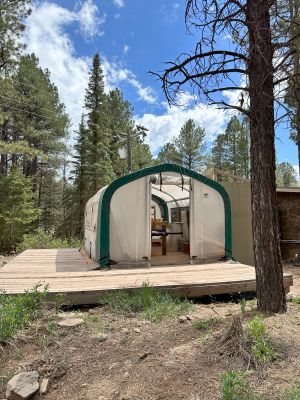Leaf Litter Decomposition: Difference between revisions
Jump to navigation
Jump to search
Florez4747 (talk | contribs) No edit summary |
Florez4747 (talk | contribs) |
||
| (One intermediate revision by the same user not shown) | |||
| Line 10: | Line 10: | ||
=== The Kraken === | === The Kraken === | ||
[[File:Kraken4.jpg||thumb|right|Photo of the outside of the 'Kraken' a structure at the Arboretum in Flagstaff, Arizona where research pertaining to litter decomposition is conducted. ]] | |||
= Related = | = Related = | ||
[[Carbon Stocks]]; [[Carbon cycle]]; [[Functional complexity]] | [[Carbon Stocks]]; [[Carbon cycle]]; [[Functional complexity]]; [[Aquatic Carbon Fluxes]] | ||
= Sources = | = Sources = | ||
Latest revision as of 20:11, 3 July 2023
Litter decomposition provides the base of food webs for both terrestrial and aquatic ecosystems.
"Litter decomposition is defined as the process through which dead organic material is broken down into particles of progressively smaller size, until the structure can no longer be recognized, and organic molecules are mineralized to their prime constituents: H2O, CO2 and mineral components"[1]
Research Methodologies
Northern Arizona University
The Kraken
Related
Carbon Stocks; Carbon cycle; Functional complexity; Aquatic Carbon Fluxes
